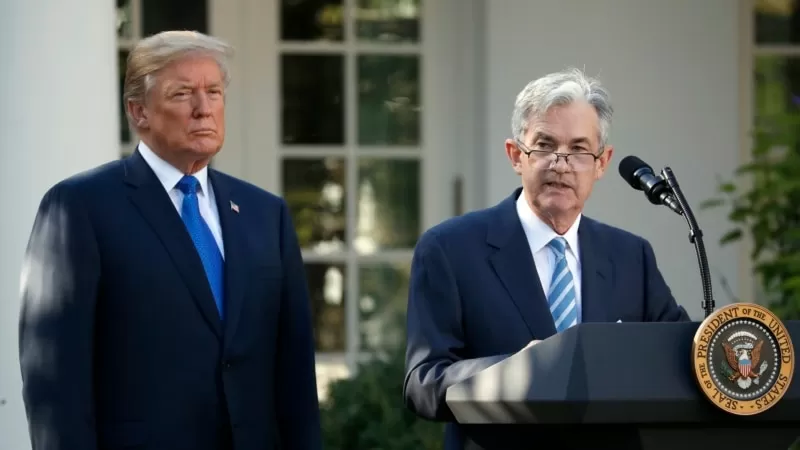The United States is constantly making headlines with its trade policies, and the latest announcement by President Donald Trump is no exception. On Wednesday, Trump took to social media to declare his intention to push for lower interest rates alongside his tariff policies, stating that this move would “go hand in hand” with upcoming tariffs. The president’s bold statement has once again raised concerns about the intersection of politics and monetary policy, but Trump remains firm in his stance.
The controversy surrounding this announcement stems from the traditional practice for U.S. presidents to avoid any involvement in monetary policy, which falls under the jurisdiction of the Federal Reserve. However, Trump has not shied away from making his opinions known on the matter. During a videoconference at the World Economic Forum in Davos, Switzerland, Trump stated that he would “demand that interest rates drop immediately.” He also asserted his belief that he understands interest rates better than the Fed officials themselves.
This push for lower interest rates is not just a standalone policy for Trump; it is meant to go hand in hand with his plans for reciprocal tariffs on trading partners. In fact, the president announced on Wednesday afternoon that he would be approving these tariffs in the coming days, stating “We’re going to be doing reciprocal tariffs…if they charge us, we charge them.” The implementation of these tariffs is a high priority for the president, with White House economic adviser Kevin Hassett promising “a lot more action” on the matter.
The concept of reciprocal tariffs is not a new one. Under World Trade Organization rules, member countries have the right to impose tariffs on imports. However, these rates are typically negotiated at the WTO to determine the maximum tariff rate that a member country can impose on imports from other member countries. By implementing reciprocal tariffs, the U.S. is essentially matching the tariffs imposed by other countries, a move that Trump believes will help level the playing field in trade.
But while Trump is confident in his decision to push for lower interest rates and reciprocal tariffs, some economists have warned against the potential consequences of this approach. Joseph Gagnon, senior fellow at the Peterson Institute for International Economics, believes that this plan reflects a “misunderstanding of how the economy works.” He explains that tariffs directly raise prices, leading to inflation, and that cutting interest rates excessively can also be inflationary. This combination could have the opposite effect of what Trump intends, potentially causing economic instability.
This warning is particularly relevant in light of recent economic data. The U.S. government released figures on Wednesday showing a rise in inflation to 3% in January, with last month’s annual pace at 2.9%. Trump had campaigned on lowering high consumer prices that he attributed to his predecessor, Joe Biden. White House Press Secretary Karoline Leavitt placed the blame on the current administration’s “mismanagement of the inflation crisis” and lack of transparency. However, Trump’s belief that his economic approach will lead to lower inflation remains unwavering.
In addition to concerns about inflation, there is also the looming threat of a trade war. Just this week, Trump announced his decision to impose 25% tariffs on all steel and aluminum imports, a move that will affect top U.S. suppliers such as Canada, Brazil, and Mexico. This decision has already sparked retaliatory actions from the European Union, with their chief Ursula von der Leyen vowing that this “will not go unanswered.” China has also begun implementing tariffs on certain American goods, and trade ministers from the EU are meeting to determine their next steps.
The U.S. has also delayed enacting a 25% tariff on goods from Mexico and Canada for a month, in order to allow for negotiations on the issue of border security and the flow of illegal drugs. If enacted, these tariffs would affect over $1 trillion in trade imports and could have a significant impact on the U.S. economy, accounting for 5% of the gross domestic product.
With the potential for a trade war and concerns about the impact of tariffs and interest rates on the economy, some economists are urging caution. Joseph Brusuelas, chief economist at financial advisory firm RSM, believes that if the trade skirmishes escalate, the U.S. could see a slowdown in economic growth, increased inflation, and a widening of the current account deficit. This could all occur amid higher interest rates, potentially causing further economic instability.
Despite these warnings, Trump remains resolute in his approach. He believes that his strategy will


